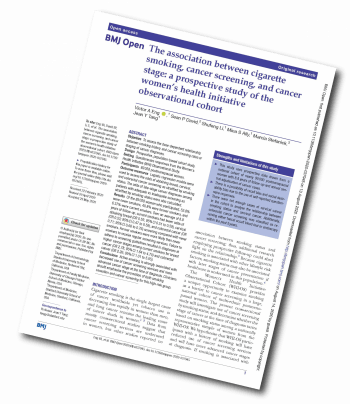
Even though smoking is an important cause of multiple cancers, women who smoke are less likely to get recommended cancer screening tests than those who don’t smoke. That’s the finding from a new study of the large Women’s Health Initiative. Published yesterday in the journal, BMJ Open, the study followed 89,000 U.S. women for just under nine years, tracking their health and screening history, among other factors, along the way.
Compared to women who had never smoked, those who currently smoked were 45 percent less likely to have been screened for breast cancer, 47 percent less likely to be screened for cervical cancer, and 29 percent less likely to be screened for colon cancer. And the more people currently smoked, the less likely they were to get screened.
Interestingly, previous smokers who had quit were about five to ten percent more likely to get screening tests for breast and cervical cancer than those who had never smoked. “Concern for personal health is the most common reason given for smoking cessation among former smokers,” which may be a possible reason for this link, speculated the authors in the article.
The study also found distinct links between skipped cancer screenings and the diagnosis of later stage, harder-to-treat cancer. For all women, smokers and non-smokers combined, those who had never had a mammogram had double the risk of late-stage breast cancer compared to those who had had a mammogram. In current smokers, the risk of late-stage cancer was tripled.
Just over six percent of women in the study were current smokers, with approximately 53 percent never smokers and 41 percent former smokers. Over the course of the study, 7,054 cases of breast cancer were diagnosed, along with 1,600 cases of colorectal cancer and 61 cases of cervical cancer.
This study helps reinforce the message that recommended cancer screenings are important for all women. And that those who currently smoke may need particular encouragement – and in a couple key directions:
“Clinicians should emphasize the promotion of both smoking cessation and cancer screening for this high-risk group,” the authors concluded.